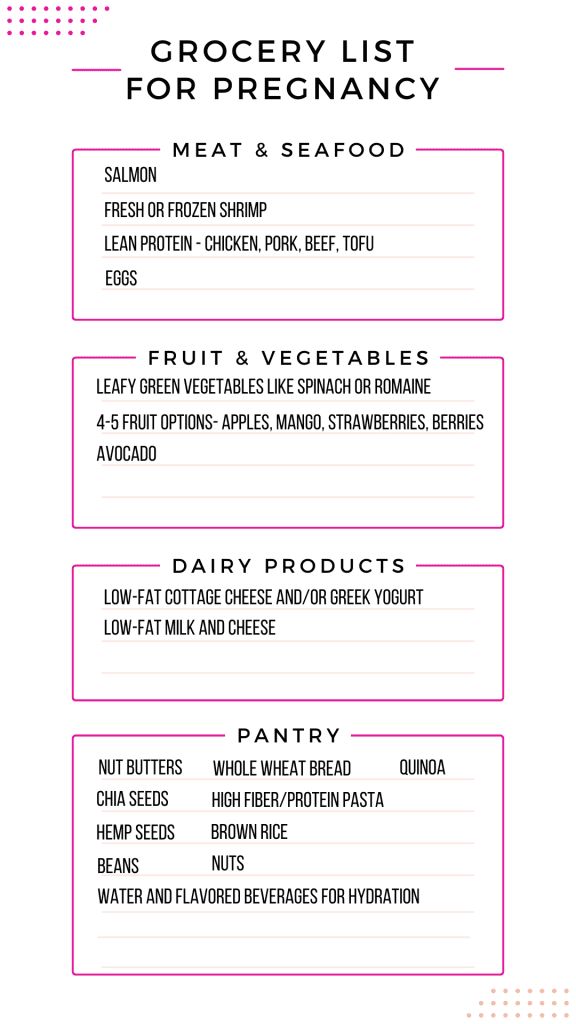
Pregnancy is a roller-coast of emotions and complex feelings. We all want the best for our growing baby- but the nutrition advice during this time can be confusing and misleading. Using evidence-based research, this post will provide a grocery list for pregnancy which prioritizes the most important nutrients (and explains why!).
Our body goes through so many changes which can make consuming a nutritious diet challenging during pregnancy. Use this post as a guide to provide you with the knowledge needed for a healthier pregnancy.
What to Prioritize On Your Grocery List During Pregnancy
Let’s go over some of the most important nutrients during pregnancy, and the best foods to eat to ensure we are getting them.
Protein
Protein needs are increased during pregnancy to support the growth of the fetus and placenta (1). It is recommended to consume about 1.1 grams of protein/kg of bodyweight per day, or at least 71 grams of protein per day in the second and third trimesters (2, 3).
The quality of protein is also very important – focus on sources which contain a high biological value. Examples include lean protein like chicken, eggs, fish, tofu, seeds, nuts and legumes.
To ensure you’re getting enough protein during pregnancy, I recommend 20-30 grams of protein with every meal! This allows for even protein distribution throughout the day and increased likeliness of meeting the increased needs.
Smoothies can be a nutritious option if you’re having difficulty meeting your protein needs. However, there are guidelines to follow when selecting a protein powder (found in this post – best protein powders for pregnancy).
Healthy Fats
Healthy fats in the form of omega-3 fatty acids can be beneficial during pregnancy, which is why they are found in most prenatal vitamins. These fatty acids are critical building blocks of your baby’s brain and retina (4).
Consuming 1-2 servings of low mercury fish or shellfish per week ensures you and your baby are getting the benefits of omega-3 fatty acids. Examples include shrimp, salmon and cod. Check to see if your prenatal includes DHA or EPA. If not, make fish a priority on your grocery list.
Hemp and chia seeds are also a good source of omega-3 fatty acids (read more about this in my top 5 best foods).

Vitamin D
Vitamin D is a fat-soluble vitamin found in foods such as fatty fish. It can also be synthesized by the skin through the sun’s ultraviolet rays. Vitamin D is commonly lacking in most Americans’ diets, therefore, deficiency is common in pregnant women.
Research has shown that maintaining a normal Vitamin D status may improve perinatal outcomes (5). Foods highest in vitamin D include fortified milk, cereal, salmon and eggs.
Folate
Folate is an important nutrient for preventing neural tube defects, specifically in the first trimester of pregnancy.
Most pre-natal vitamins contain 100% folic acid, however, not all is converted into the active form (5-MTHF). Therefore, it’s important consume foods rich in folate. Examples include dark, leafy vegetables, sunflower seeds, beans, whole grains, asparagus, broccoli, and eggs.
Iron
Pregnancy increases your risk of iron deficiency – which is associated with adverse maternal and neonatal outcomes such as increased risk of pre-term birth and low birthweight (6). Eating foods rich in iron, such as lean red meat, poultry, fish, fortified cereals, and dark leafy green vegetables, can help to prevent deficiency
Calcium
Calcium consumption should be encouraged during the second and third trimesters of pregnancy, as it helps assist with fetal skeleton development. High calcium foods include dairy products, green leafy vegetables, baked beans, edamame, chia seeds and some cereals.
It has also been shown to decrease the risk of high blood pressure, neonatal mortality, and pre-term birth (7).
Magnesium
Research has shown that pregnant women with a magnesium deficiency have been associated with adverse outcomes such as fetal growth restriction, pre-term labor, pregnancy-induced hypertension, gestational diabetes, and leg cramps (8).
Try to consume foods high in magnesium on a regular basis, such as pumpkin seeds, chia seeds, almonds, avocado, spinach, cashews, and peanuts.
Choline and Iodine
Both of these micronutrients play an important role in fetal brain development, therefore, it’s important to consume adequate amounts during pregnancy.
Choline can be found in egg yolks, red meat, tilapia, salmon, cod, and chicken breast. High iodine foods include fish, shellfish, “iodized” salt, dairy, eggs and chicken.
Printable Grocery List For Pregnancy With Top Recommended Foods
Below is the printable grocery list to help you prioritize these essential nutrients during your pregnancy. Use this list and add to it with your family’s food preferences. Ideally, meals should contain a complex carbohydrate (with fiber), a high-quality protein source, and a fruit or vegetable.
Top 5 Foods for Pregnancy (and WHY)
1. Low mercury fish, like salmon and shrimp, because they’re high in omega-3 fatty acids, vitamin D, iodine, choline, AND protein.
2. Hemp and Chia Seeds. These tiny but mighty seeds are a great source of omega-3 fatty acids. Hemp seeds contain 10 grams of high-quality protein per serving. Chia seeds are rich in fiber, which might help with the constipation we often face during pregnancy. Add them to smoothies, yogurt, salads, soups, or baked goods.
3. Eggs. Not only are eggs a high-quality protein source, they contain vitamin D, folic acid, choline, and iodine.
4. Leafy Green Vegetables like kale, swiss chard, cabbage, collard greens, spinach, and romaine, as they are packed with essential nutrients like magnesium, folate, and iron.
5. Cottage Cheese and Greek Yogurt. Another source of protein that is so versatile, with 13 grams per 1/2 cup serving. Both are good sources of calcium as well.

Healthy Snack Ideas for Pregnancy
- Avocado Toast
- Guacomole and Chips
- Apple Slices with Nut Butter
- Vegetables with Greek Yogurt Dip
- Smoothies
- Cucumber Bean Salad
- Cottage Cheese Fruit Bowl
- Greek Yogurt with Hemp or Chia Seeds
- Hard-Boiled Eggs
- Trail Mix
- Almonds, Walnuts, Cashews
Perfection Is Impossible During Pregnancy
Eating a “perfect” diet is near impossible with all the changes our body goes through during pregnancy.
However, if you came here hoping to learn more about having a healthy pregnancy, I sincerely hope this post helped you understand which foods to include in your pregnancy diet and why.
